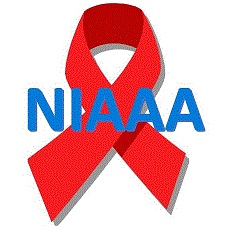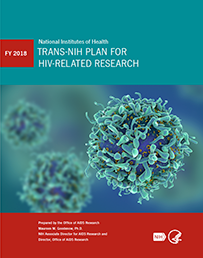HIV/AIDS and Alcohol Research Program
Welcome to the Alcohol and HIV/AIDS Research Program

HIV/AIDS and Alcohol
Learn more about alcohol and HIV/AIDS
- NIAAA HIV/AIDS
- HIV/AIDS - Alcohol Research and Health Issue
- AIDS and Behavior Supplement Issue on Alcohol as a Barrier to Eliminating HIV
- HIV/AIDS Alcohol Alert
NIH Alcohol-HIV/AIDS Research Areas
Alcohol misuse facilitates HIV infection, accelerates disease progression, and hastens the deaths of those who have progressed to AIDS, but the mechanisms for these interactions are not well understood. Alcohol can exacerbate HIV-associated comorbid conditions, such as tuberculosis and hepatitis C virus, and it has been linked to the development of other diseases in HIV-infected individuals. Alcohol also contributes to age-related medical problems, including cardiovascular dysfunction, peripheral neuropathies, and neurocognitive impairments in HIV-positive individuals. In addition, little is known about how alcohol affects the effectiveness of HIV treatment and prevention medications.
The NIH Overarching HIV/AIDS Research Priorities for AIDS Funding support cross cutting basic research, health disparities, behavior and social science research, and training to:
- Reduce the Incidence of HIV/AIDS

- Implement Next Generation HIV Therapies
- Research Toward a Cure
- HIV-associated Comorbidities, Complications, and Coinfections
A full description of the NIH HIV/AIDS research priorities can be found in the FY2018 Trans-NIH Plan.
Additional information is available at the NIH HIV/AIDS Research Priorities and Guidelines for Determining AIDS Funding.
Alcohol HIV/AIDS Research Priorities
- Reduce incidence and improve prevention strategies among individuals who drink, including research on effectiveness of preventive strategies under development (i.e., vaccines and microbicides)
- Improve the uptake and consistent use of PrEP, PEP, and strategies to improve HIV testing and entry to treatment for women and men who drink across a range of severity, including multi-level interventions and measures that impact at the population level
- Implement the next generation of HIV therapies with better safety and ease of use (over the lifespan) for individuals who demonstrate toxicities related to past and/or current alcohol use patterns
- Development/testing of HIV treatments (long-lasting, less toxic, and fewer complications)
- Understand the barriers to implementation of treatment as prevention within the clinical cascade
- Assess treatment outcomes in the populations of interest (who drink across a range of severity)
- Facilitate research toward a cure for HIV/AIDS (identification, control of viral reservoirs)
- Novel strategies for research toward a cure related to delayed care and increased inflammatory response among people living with HIV who misuse alcohol
- HIV-associated comorbidities and co-infections (targeting interventions to alcohol users)
- Prevention and treatment of HIV-associated comorbidities, coinfections, and related complications of particular significance for drinkers’ morbidity and mortality, including HCV, TB, HBV, and hepatic, cardiovascular, and neurological disorders
- HIV/alcohol translational research that addresses health and behavioral/social issues clearly linked with HIV (transmission acquisition, pathogenesis, mobility and mortality, stigma, adherence) and examines them in the context of HIV, such as other infectious pathogens and diseases, non-infectious pathogens and diseases, other substance use/addiction, and mental health disorders
- Cross cutting areas/Foundational research
- Basic behavioral and biological research, health disparities in key populations exposed to alcohol (e.g., men who have sex with men, newly infected, minorities, and young women in both domestic and international settings)
- Cross training of HIV and alcohol researchers in use of new tools/techniques and research capacity building
Funded NIAAA HIV/AIDS Research
Consortia for HIV/AIDS and Alcohol Research Translation (CHAART)
The Consortia for HIV/AIDS and Alcohol Research Translation (CHAART) involves researchers at The Johns Hopkins University, Yale University, Brown University, Boston University, the University of Alabama, the University of Washington, and several Florida-based institutions. All are studying large-scale cohorts. These consortia build on an infrastructure already in place and promote collaboration between multiple universities. The consortia members share data on critical variables and outcome information for their interventions. They also share their intervention research outcomes with a centralized operations research center located in New York City. The operations research center includes mathematical researchers who model and simulate AIDS and alcohol interactions and then validate them against real-world outcomes. They will help translate research into a database of practical models that the medical community can implement in populations living with HIV/AIDS.
- Alcohol Research Consortium in HIV (ARCH)
- Alcohol and HIV: Biobehavioral Interventions and Interactions
- Comprehensive Alcohol-HIV/AIDS Research Center (CARC)
- Consortium to Improve Outcomes in HIV/AIDS, Alcohol, Aging, and Multi-Substance Use (COMpAAAS)
- Southern HIV Alcohol Research Consortium (SHARC)
- URBAN ARCH
Other major HIV cohort studies supported by NIAAA
- The Pediatric HIV/AIDS Cohort Study (PHACS) network, sponsored by the NICHD, with co-funding from NIAID, NIDA, NIDCD, NIMH, NHLBI, NIDCR, NINDS, and NIAAA, is a longitudinal cohort study established to address two critical pediatric HIV research questions: the long-term safety of fetal and infant exposure to ART and the effects of perinatally acquired HIV infection in adolescents.
- The Veterans Aging Cohort Study (VACS), supported by NIAAA in collaboration with the Department of Veterans Affairs, is a prospective, observational cohort study of HIV-positive veterans and an age/race/site-matched control group of HIV-negative veterans in care in the United States. Researchers seek to understand the role of comorbid medical and psychiatric disease in determining clinical outcomes of HIV infection.
- The Center for AIDS Research (CFARs) Network of Integrated Clinical Systems (CNICS), supported by NIAID and NHLBI, is the first electronic medical records-based research network poised to integrate clinical data from the large and diverse population of HIV-infected persons. CNICS provides research infrastructure to support HIV clinical outcomes and comparative effectiveness research using data collected at one of eight CFAR sites (Case Western Reserve University, the University of Alabama at Birmingham, the University of California San Francisco, the University of Washington, the University of California San Diego, Fenway Health/Harvard University, the University of North Carolina Chapel Hill, and Johns Hopkins University).
Learn more about HIV/AIDS and NIAAA Research
- HIV/AIDS - Alcohol Research: Current Reviews
- HIV/AIDS Alcohol Alert
- Alcohol and HIV/AIDS: A Confounding Combination
- A Closer Look - Drinking by the Bucket and HIV Risk in Africa
- By the Numbers - Drinking Shortens Survival for Many HIV-Positive Individuals
- 5 Questions With Kendall J. Bryant, Ph.D.
Resources
-
NIH Resource: AIDSInfo Web Site
-
Networks related to HIV/AIDS Research
Contact
| Name | Division | Contact Information |
|---|---|---|
| Our Staff | ||
| Alcohol and HIV/AIDS Research, National Institute on Alcohol Abuse and Alcoholism (NIAAA) | ||
|
Kendall Bryant, PhD |
Director, HIV/AIDS Research, NIAAA |
Phone: 301-402-0332 Email: kendall.bryant@nih.gov |
|
Division Contacts |
|
|
|
John Matochik, PhD |
Division of Neuroscience and Behavior |
Phone: 301-451-7319 Email: jmatochi@mail.nih.gov |
|
|
|
|
|
Li Lin, PhD |
Division of Metabolism and Health Effects |
Phone: 301-443-1275 Email: linli@mail.nih.gov |
|
|
|
|
|
Joe Wang, PhD |
Division of Metabolism and Health Effects |
Phone: 301-451-0747 Email: wangh4@mail.nih.gov
|
|
|
|
|
|
Deidra Roach, MD |
Division of Treatment and Recovery |
Phone: 301-443-5820 Email: droach@mail.nih.gov |
|
|
|
|
|
Tatiana Balachova, PhD |
Division of Epidemiology and Prevention Research |
Phone: 301-443-5726 Email: tatiana.balachova@nih.gov |
|
|
|
|
|
Robert C. Freeman, PhD |
Division of Epidemiology and Prevention Research |
Phone: 301-443-8820 Email: rfreeman@mail.nih.gov |
|
|
|
|
|
Daniel Falk, PhD |
Division of Treatment and Recovery
|
Phone: 301-443-0788 Email: falkde@mail.nih.gov |
Last reviewed October 2021



